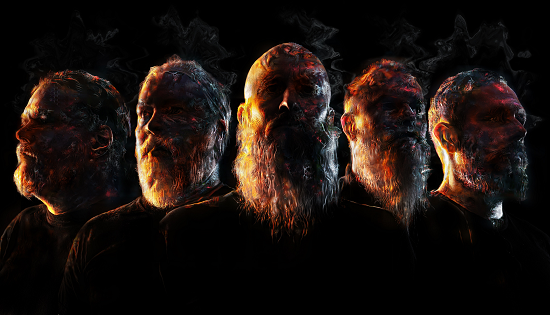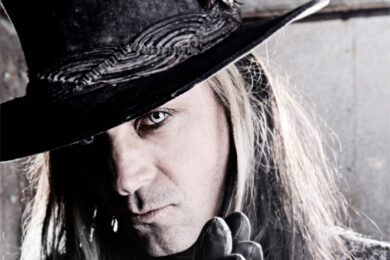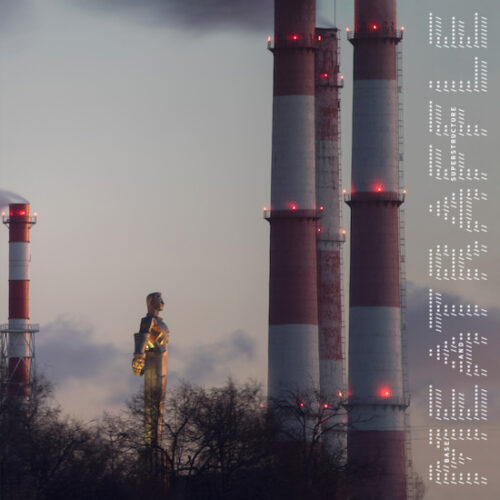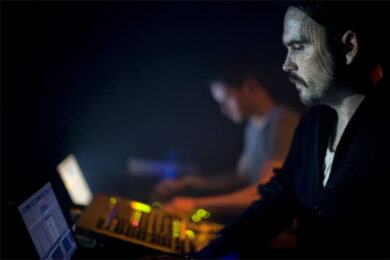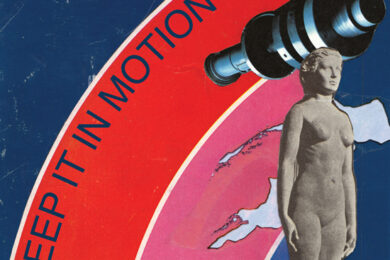On his Twitch stream recently, Limmy – sage of the dispossessed and reliable source of raver logic – had a question:
“How good would it be to go back to Ancient Egypt with, like, a generator – for electricity and all the rest of it – and speakers, and play this to the Ancient Egyptians?” He clicks on a YouTube link and the helium-voiced, frantic gabber of Dyewitness’ ‘Only If I Had One More’ pounds out. “How good would that have been?”
To paraphrase this sentiment, where do we go, as metalheads, for such a demented shock of the new in 2022? Where to for heavily amplified music that sounds like its arrived via some sadistic time traveller?
Luckily, as much as metal is regularly dismissed as retrogressive or neanderthal in aspect, there’s no shortage of the incendiary and innovatory to be found in its environs. Tilburg’s Roadburn Festival recently saw a defiant and forward-thinking assemblage of iconoclasts and seers find new ways of assaulting the senses, with the likes of Kenya’s Duma, the UK’s The Bug and Indonesia’s Senyawa all expanding the definition of what began as a predominantly stoner/doom festival. Elsewhere, Oranssi Pazuzu, Divide And Dissolve and Fluisteraars have all released records in the last year or so that balance out a colossal weight with a wide-eyed WTF.
Nonetheless, if you were asked to cite one band in the last thirty-odd years of metal history who sound like they were beamed in from the future, the answer would be Meshuggah. From their humble ‘80s origins in Umeå, Sweden as a technical thrash outfit, this band has been relentlessly reassembling the component parts of the genre into disorienting new shapes, without at any point sacrificing any of their feral intensity. From the machine-like riff science of 1995’s watershed Destroy Erase Improve to this year’s fearsome and ever-questing bombardment Immutable, these Swedish savants have essentially been the gabber-hammering speakers, and we’ve been the Ancient Egyptians.
For all their dizzying skills and technical convolutions, the band have found a style – in which intricate rhythmic filigree is anchored simultaneously to a monolithic and primal 4/4 groove – fit to engage the brain even whilst said brain is in constant motion within a head flying back and forth. Drummer Tomas Haake – he who has been at the eye of this particular hurricane for all of the last three decades – is about as unassuming an ambassador for this primal force as can be imagined, As he explains, this is explicitly not a prog metal band. “Rush did all of the 5s and 7s and 9s and all the odd meter stuff and we never really did that. Since the early days we started doing the more over-the-bar-line riffing where it turns into something else but it also maintains a flow. And I think to us that’s always been an important aspect – even though there’s great bands that do the stop-and-go, it also takes the whole headbanging aspect out of it.”
Immutable – Meshuggah’s ninth full-length outing in a resolutely bruising and brow-furrowing journey, is in one sense an aptly titled record given it’s the sound of a band who sound completely impervious to all external forces. Bass-frequency-heavy riffs which hit like enormous mechanised beasts thundering across a ruined cityscape are here in abundance, as on the monumental ‘The Abysmal Eye’, punctuated by vocalist Jens Kidman’s irascible roar. Moreover, the audial spectre of Allan Holdsworth enters the apocalyptic panorama via longtime axeman Fredirk Thordendahl’s perplexing and inimitable uber-shred – even if fellow guitarist Marten Hagstrom did the majority of the heavy lifting riff and songwriting this time around whilst Thordendahl was busy setting up his new studio.
Yet this is a band unafraid to throw curveballs like the elegiac instrumental ‘They Move Below’ , the sinister cadences of ‘Future Tense’ or the Glenn Branca-goes-necro interlude ‘Black Cathedral’ into the game. “We’re old school” reckons the percussionist, with no irony intended. “We write for an album as a whole for you to listen to it from start to finish. So it was a conscious choice to make ‘Broken Cog’ the first track where it’s something that makes the listener go, ‘What the fuck is going on?’ We wanted to put them in a different room, something that’s calmer which also messes with people’s heads. And also ‘Black Cathedral – everyone thinks the first time they hear it that I’m gonna do the first blastbeats on an album ever, but it doesn’t happen because it sounds like black metal, that kind of tremolo picking and I think it’s like 20 guitars on top of each other.”
Is that something Haake has deliberately avoided doing? “Ah, I couldn’t do it to save my life!” he splutters “I’m a slow drummer, man, I can’t do that shit!” He’s having none of the ‘drum god’ chatter that frequently follows his tub-thumping around the world’s auditoriums and internet forums. “‘You’re the best drummer in the world!’ like, no – I’m nowhere near that. I’m not even near the best drummer in my own town! Just stop it. Yes, I can do this particular thing fairly well because I’ve done it for so many years and together as a band, but this is also the only thing I’ve done. I can’t play jazz to save my life, and I’m not a professor of odd meter.”
“I have drummer friends who keep sending me videos and videos and videos of drummers and most of them are young kids that technically are wizards, and they all play really really fast!” he laughs. “And that is a side of drumming that never really intrigued me at all. It doesn’t make me feel anything. For me drummers that make me feel something always have a certain amount of oomph to their playing. Gene Hoglan and Dave Lombardo are great examples in metal. Mario Duplanter of Gojira, Eloy Casagrande of Sepultura… ridiculous drummer! The first drummers that during the British wave that really inspired me were drummers like Cozy Powell – and Vinnie Appice is one of my absolute favourite drummers ever, it’s so tasty but if you stand next to him, it doesn’t look like he’s hitting hard – he doesn’t have to because he’s got great technique."
Whether Haake considers himself a drumming innovator or not, his cyborg-like skills are borne out unfortunately by the toll his relentless hammering has taken on his corporeal realm. First of all a herniated disc caused him to “completely lose control of his right foot” in 2009. prompting back surgery. “That was a big scare – I thought for sure that was the end of the career there”. More recently he’s been hit by a seemingly undiagnosable form of eczema on his hands which has blighted the making of the new album, although thankfully he’s seen some improvement on this of late. These are only the latest in an intimidating litany of medical emergencies that have plagued this band virtually since their inception, including Fredrik Thordendahl nearly losing his ring finger in an industrial accident back in 1991, saved only by a resourceful co-worked packing the detached digit in ice and the guitarist overcoming his painful delirium to instruct the surgeons to re-attach it at an angle, the better to facilitate future shred.
Meshuggah have always seemingly inhabited some Phillip K. Dick-esque reality of intimidating new assemblages of man and machine, yet have someone managed to do this whilst avoiding all or any of the cyber-cliches that have weighed down a number of their original contemporaries (mentioning no names here, Fear Factory) The savagely precise yet jarringly abstract nature of their assault also makes it surprisingly hard to spot precedents for their style, beyond the obvious Metallica influence that that the band themselves admit cast a shadow over 1990’s debut Contradictions Collapse. Even then, the assumption that it was the austere and mechanical labyrinths of …And Justice For All were the main catalyst proves somewhat wide of the mark.
“No! Actually we were all very disappointed with that album. I guess it’s the production more than anything else maybe – there’s like no bass on it, it’s very dry sounding, very boring sounding. But there was also this German band Holy Moses. They had two albums – New Machine Of Liechtenstein and Finished With The Dogs – we had really taken a chunk of Holy Moses and made it our own – it comes across in the riffing and it comes across in the early drumming too, where you would throw the beats around a lot and play offbeat onbeat – that I think was a very important band in terms of shaping the early sound of Meshuggah.
The first large-scale evolutionary lurch from the thrash world came with the dystopian Destroy Erase Improve however, by which point all manner of rackets had entered the picture and been mangled into the merciless riffing machine: “Way more of the stuff we listened to at the time would be like Allan Holdsworth and Chick Corea – fusion stuff combined with anything from Pantera to Primus. For me the band Cynic – the first album Focus was huge – and Faith No More were absolutely huge influence. You had a mish-mash of all this stuff – we always tried very hard to not have those influences be really audible in our stuff, so we never took anything like a riff and called it ours.”
Such has been the forward-thinking nature of this band, as well as their relentless appropriation of technology, that it’s often seemed like the tools at their disposal have had to evolve to fit their mindset rather than vice versa. The quest for ever more earthshaking riffs meant that 2002’s Nothing was hampered in the studio by the band being unable to find 8-string guitars that stayed in tune long enough for a take. Similarly, 2005’s nightmarish piece-de-resistance of fevered abstraction Catch 33 was recorded entirely with programmed drums on the ‘Drumkit From Hell’ programme that the band had developed themselves, a development Haake is characteristically blasé about. “I was like ‘this is such a monster It would have taken another six months if I was to learn all that stuff and then record it in a studio, so that’s fine by me.”
A certain ego-free quality within the band has almost certainly been an ingredient in their lengthy and relatively harmonious history, not to mention an us-against-the-world approach borne of being perpetual outsiders, frequently misunderstood by all those around them. This included their own former label Nuclear Blast; a series of misappropriations started with the band rolling their eyeballs at the boilerplate death metal imagery used to promote them, and reached a head at the Catch 33 launch party, where their own label seemed more confused than anyone by the off-map machinations.
“I’m gonna spill it, I never really talk about this, but they did a release party for Catch 33, and they had mentioned something about straitjackets, so…” Haake sighs. “OK, so we go to Germany, and they pick us up and we go to this abandoned old asylum, and they had invited a bunch of reporters and press and stuff, I dunno, like 60 or 70 people, and they made them all wear straitjackets so they couldn’t take notes on the first listen through. And it sounded terrible, because it was concrete, so it was boomy and weird sounding, and to top it off at the end of the night, when everyone was good and mighty drunk, a stripper comes out! Dressed like a nurse. It was so awkward. Where do you make that connection? It was just straight up weird, man.”
The industry infrastructure, mentalities and equipment may have struggled to deal with them, but Meshuggah have ultimately proven to be a band whose style has now infiltrated the broader language of the world that birthed them. Standing atop the metal fray, their warping of the space-time continuum continues, making them custodians of a pulverising onslaught so potent and singular that a whole sub-genre, the unpoetically named ‘djent’, has ended up having to be invented to accommodate it.
For the white-haired giant at the helm however, this, along with everything else, is no big deal. “I think we all take a certain amount of pride in that. At the end of the day it’s humbling. If they wanna see us as the founding fathers, it’s cool,” Haake shrugs graciously.
“We’ll take it. I do sometimes have negative connotations too though, because some bands that are djent lack the absolutely necessary set of balls that you have to have to do something for me."
Meshuggah’s new album Immutable is out now via Atomic Fire. The band play Dublin tomorrow (June 1) and London on Friday (June 3) as part of a European tour, find full dates and tickets here.

